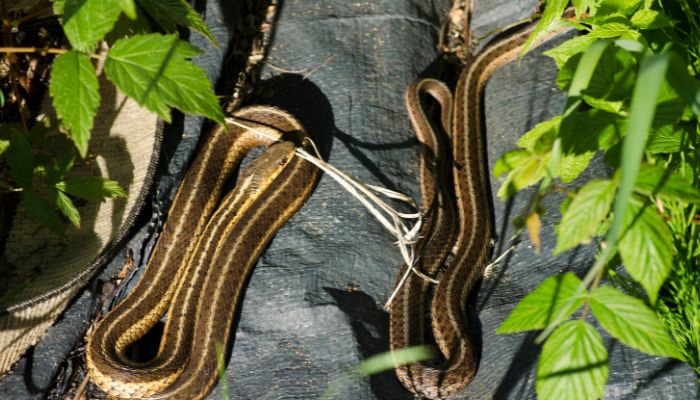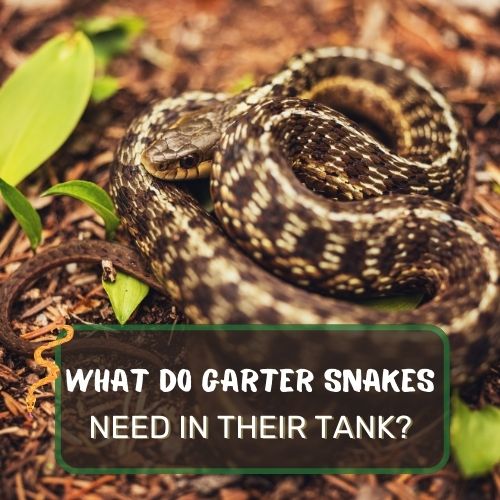Garter snakes, with their slender bodies and vibrant patterns, are a common sight in many gardens and backyards. But there’s one peculiar trait that often raises eyebrows: their distinct smell.
Garter snakes have a distinct smell due to their diet and defense mechanisms. Consuming fish or worms can lead to pungent feces. Additionally, when threatened, they release a musky odor as a deterrent. This combination of diet and natural defense gives them their unique aroma.
In this article, we’ll unravel the mystery behind the aromatic aura of these fascinating reptiles.
From their diet’s influence on their scent to the science of snake feces and the intriguing defense mechanism of musking, we’ll dive deep into the factors that contribute to their unique aroma.
So, if you’ve ever wondered, “Why do garter snakes smell bad?”, you’re in for an enlightening journey!

Table of Contents
Garter Snakes: Smellier Than Average?
There’s one question that has puzzled many a snake enthusiast and casual observer alike: Why do garter snakes smell… well, bad? Let’s dive into this aromatic mystery.
How Garter Snakes Compare to Other Snakes in Terms of Smell
When it comes to the world of snakes, garter snakes have somewhat of a reputation. While not all snakes are known for their distinct odors, garter snakes have earned a special place in the olfactory hall of fame (or should we say infamy?). But why is that?
Firstly, it’s essential to understand that not all snakes smell the same. Just as dogs have their unique scents based on diet, environment, and health, snakes too have their aromatic nuances.
However, garter snakes tend to be on the smellier side of the spectrum. This isn’t just a random quirk; it’s a combination of their diet, defense mechanisms, and physiology.
The Impact of Their Diet on Their Smell
Diet plays a significant role in the scent saga of the garter snake. These snakes have a varied diet, which can include worms, fish, and even small mammals. Now, if you’ve ever been near a pond or a fish market, you know that fish can have a strong odor.
When garter snakes consume fish, their feces can be, well, extra-stinky. Worms, on the other hand, lead to a more watery fecal consistency, which can also contribute to a stronger smell.
But here’s a twist: if you feed a garter snake mice, their odor isn’t much different from the average snake. It’s all about what goes in. Think of it like humans and garlic. Eat a garlic-heavy meal, and well, you know the rest.
In the grand scheme of things, while garter snakes might be a bit smellier than their slithering counterparts, it’s all part of their unique charm. Their diet, combined with their natural defense mechanisms (hello, musking!), gives them a scent that’s unmistakably theirs.

The Science Behind the Smell
Ever wondered about the science behind that distinct garter snake aroma? Well, fasten your seatbelts, because we’re about to embark on a fragrant journey into the world of snake scents!
The Nature of Snake Feces and its Comparison to Bird Feces
Let’s talk poop. Yep, you read that right. To understand the garter snake’s unique smell, we need to delve into the nature of their feces. Snake feces, especially from garter snakes, has a consistency and odor influenced heavily by their diet.
Remember those fish and worms we talked about? They play a starring role in this aromatic drama.
Interestingly, the nature of snake feces has a striking resemblance to bird feces. If you’ve ever had a pet bird or been near a bird sanctuary, you’ll know that bird droppings have a distinct smell when wet but tend to lose their odor as they dry.
The same goes for our slithery friends.
The Intensity of the Smell Right After Defecation vs. When it Dries
Immediately after a garter snake relieves itself, the smell can be quite potent. It’s fresh, wet, and, well, pungent. However, as with many things in nature, this too shall pass.
As the feces dries, the intensity of the smell diminishes significantly. So, if you’re ever around a garter snake post-potty time, just give it a moment. The air will clear up soon enough!

Musk: The Other Culprit
Now, let’s shift gears and talk about another aromatic aspect of garter snakes: musk.
Introduction to the Concept of Musking in Snakes
Musking is a defense mechanism employed by many snakes, not just garters. When threatened or handled, some snakes release a foul-smelling liquid from their cloaca.
This musk serves as a deterrent, discouraging potential predators or overly curious humans from getting too close.
Why Garter Snakes are More Prone to Musking
Garter snakes have somewhat of a reputation in the musking department. While the exact reasons are still a subject of study, it’s believed that garter snakes, being smaller and more vulnerable, might rely more heavily on musking as a primary defense mechanism.
It’s their way of saying, “Back off, buddy!”
The Unpredictability of Which Snakes Will Musk
Here’s where it gets interesting. Not all garter snakes are musk-producers. Some might go their entire lives without releasing that pungent aroma, while others might be regular musketeers. It’s a bit of a musk lottery.
Factors like age, size, and temperament play a role, with younger, smaller snakes being more prone to musking. But, as with many things in nature, there’s always an element of surprise.
You might just come across a big, mature garter snake that decides to give you a whiff of its signature scent!

Mitigating the Smell
Alright, so we’ve established that garter snakes can be a tad aromatic. But fear not! If you’re a garter snake enthusiast or considering becoming one, there are ways to keep that distinct smell in check.
Let’s explore some tried-and-true methods to mitigate the olfactory impact of these fascinating reptiles.
Tips for Maintaining a Clean Terrarium
A clean home is a happy home, and this holds true for garter snakes as well. Here are some pointers:
- Substrate Selection: Opt for substrates that are easy to clean and replace, like newspaper or paper towels. They’re not only absorbent but also make spotting and cleaning up feces a breeze.
- Spot Cleaning: Instead of waiting for a full terrarium cleanup, do regular spot checks. If you notice any feces or soiled substrate, remove it promptly.
- Ventilation: Ensure your terrarium has adequate ventilation. Good airflow can significantly reduce the buildup of unwanted odors.
The Importance of a Regular Cleaning Schedule
Consistency is key. Setting a regular cleaning schedule ensures that waste doesn’t accumulate. Depending on the size of your terrarium and the number of snakes, a bi-weekly or weekly cleaning might be ideal.
Remember, a clean environment is not only pleasant for you but also healthier for the snake.
Diet Modifications to Reduce the Intensity of the Smell
As we’ve discussed, diet plays a pivotal role in the smell saga. Consider feeding your garter snake a mouse-based diet. Mice tend to produce less pungent waste compared to fish or worms.
It’s a win-win: nutritious for the snake and less aromatic for you!

Handling Techniques to Avoid Stressing the Snake and Inducing Musk
Handling a garter snake can be a delightful experience, but it’s essential to do it right to avoid any musky surprises. Here’s how:
- Gentle Approach: Always approach your snake calmly and gently. Quick or aggressive movements can stress them out, increasing the chances of musking.
- Support Their Body: When picking up a garter snake, ensure you support as much of their body as possible. This makes them feel secure and reduces stress.
- Limit Handling Time: Especially for new or young snakes, keep handling sessions short and sweet. Over time, as the snake becomes more accustomed to you, you can gradually increase the duration.
- Observe Their Behavior: If your snake seems agitated or stressed, it’s best to give them some space and try handling another time.
Remember, patience and understanding are crucial. With time and consistent, gentle handling, your garter snake will become more accustomed to you, reducing the chances of any musky incidents.
Enjoy the journey of bonding with these incredible creatures!
Conclusion
You’ve journeyed through the intriguing world of garter snakes and their unique aroma. From their varied diet influencing their scent to the natural defense mechanism of musking, you now understand the factors behind their distinct smell.
Remember, every trait of these fascinating creatures, even their scent, plays a vital role in their survival. As you encounter or care for garter snakes, embrace their uniqueness.
With your newfound knowledge, you’re better equipped to appreciate and care for these remarkable reptiles. Keep exploring and stay curious!
FAQ
Navigating the world of garter snakes can bring up a plethora of questions. Here’s a quick rundown of some frequently asked queries to quench your curiosity:
What do garter snakes smell like?
Garter snakes have a distinct aroma, often described as musky or earthy. This smell is a combination of their diet, feces, and the musk they release as a defense mechanism. If you’ve ever been near a pond or a fish market, the smell after they’ve eaten fish might remind you of that.
Why do some snakes stink?
The “stink” from snakes primarily comes from their feces and the musk they release. Diet plays a significant role; for instance, a fish or worm diet can produce a stronger odor in their waste. Additionally, some snakes release musk as a defense mechanism when they feel threatened.
Do garter snakes bite?
While garter snakes are generally docile, they can bite if they feel threatened or cornered. However, their bite is not venomous and is usually more of a surprise than a harm. It’s always essential to handle them gently and calmly to avoid any nippy situations.




0 Comments